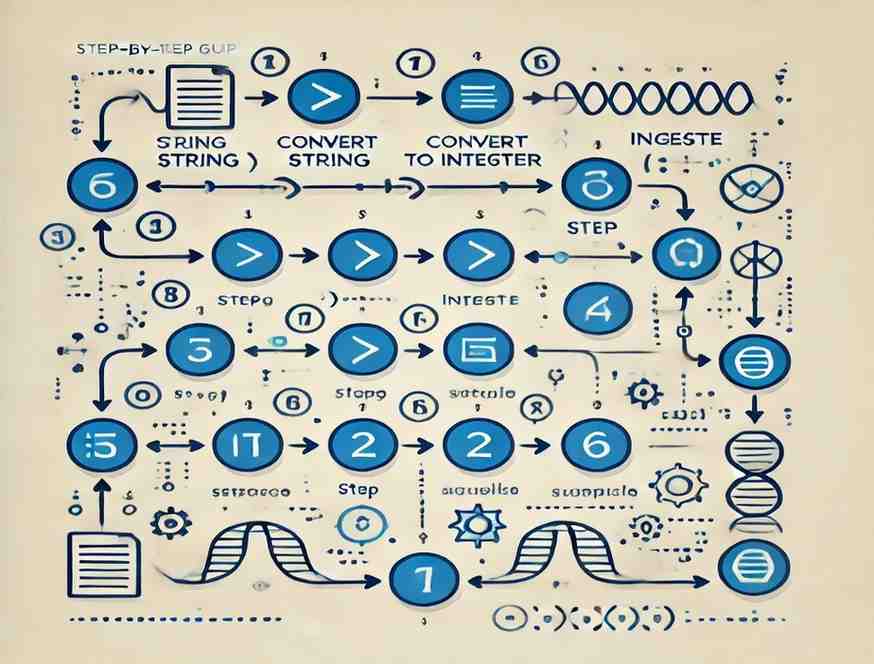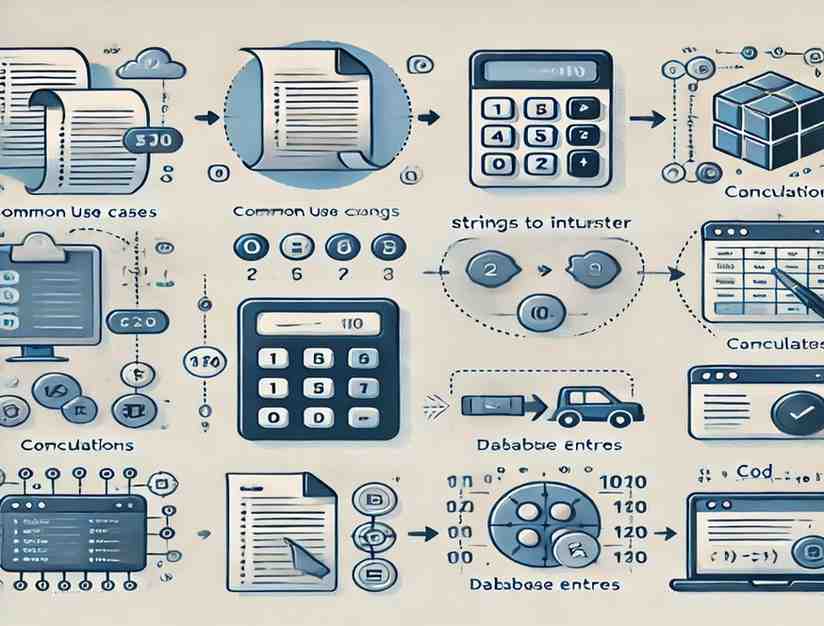Converting data from one type to another is a fundamental aspect of workflow automation, particularly when numerical operations are involved. In this guide, we focus on how Power Automate convert string to integer, a critical task that enhances data processing capabilities in any automated flow. This conversion allows for smoother handling of numeric values, essential for calculations, data validation, and conditional logic. We will cover step-by-step methods to perform this conversion, ensuring efficient data transformation.
Furthermore, we’ll discuss common use cases and provide troubleshooting tips to tackle potential issues. Mastering the Power Automate convert strings to integers function improves both accuracy and reliability in automation processes.
Understanding the Need for Data Type Conversion
Understanding the importance of data type conversion is crucial for ensuring seamless data handling during system interactions. When working with strings extracted from forms or external sources, you often need to convert strings to integers in Power Automate to perform essential calculations. This conversion enables workflows to function properly by allowing numerical operations that wouldn’t be possible with string data.
Power Automate provides a simple and effective method for this conversion, ensuring both data integrity and smooth process execution. By addressing discrepancies in data types, you can enhance the reliability and efficiency of your automated workflows.
The Basics of String to Integer Conversion in Power Automate
String to integer conversion in Power Automate involves using specific expressions that efficiently transform string values into usable integers. By applying these expressions, you can easily convert strings to integers in Power Automate, enabling numerical operations that are otherwise impossible with string data. This conversion proves especially beneficial in scenarios dealing with financial data, where precise calculations are necessary.
It is also critical for user inputs that require further processing, such as comparisons or mathematical operations. By mastering the ability to convert strings to integers in Power Automate, you can enhance the flexibility and functionality of your workflows, particularly in tasks that rely on accurate numerical computations.

Here is the unique image representing a Step-by-Step Guide to Convert String to Integer. It visually illustrates the process in a clear and structured way.
Step-by-Step Guide to Convert Strings to Integers in Power Automate
Making convert strings to integers in Power Automate is a straightforward process that can be implemented in just a few easy steps. First, identify the string you wish to convert, typically stored in a variable or input field. Then, use the int() function, which is designed to convert strings to integers in Power Automate efficiently. This function takes the string as an argument and transforms it into an integer value.
After conversion, you can use this integer for calculations or conditions within your workflow. By following these steps and applying the conversion properly, you can ensure smooth and accurate data processing in your automated workflows.
Using the int() Expression
The int() expression in Power Automate is a powerful tool to efficiently convert strings to integers in Power Automate workflows. This function is essential when you need to transform numeric string data into integers for calculations or evaluations. By applying the int() function to string variables, you ensure that the data can be used in numeric operations.
This expression is commonly used within flow steps where accurate data manipulation is critical, ensuring smooth and error-free workflow execution.
Handling Errors During Conversion
Handling errors during the process to convert strings to integers in Power Automate is essential for maintaining smooth workflow operations. If the string contains non-numeric characters, the conversion will fail, potentially causing disruptions in your flow. To manage this, Power Automate offers built-in error-handling mechanisms, such as conditions and Scope actions, which help catch and address these issues before they cause problems.
By incorporating these tools, you can ensure your automation continues running efficiently, even when data isn’t in the expected format. Proactively handling conversion errors allows you to build more resilient workflows, minimizing potential failures and improving overall reliability.

Here is the unique image representing Common Use Cases for String to Integer Conversion. It showcases various scenarios where this conversion is typically required.
Common Use Cases for Convert Strings to Integers in Power
Converting strings to integers in Power Automate is frequently necessary in many automated workflows. This functionality is essential when processing data from forms, where numeric input is often received as text. For example, you may need to perform calculations or comparisons, which require numeric values. Additionally, this conversion is crucial for database updates, ensuring that integer fields are correctly populated.
Another common use case is in loops, where numeric counters are needed for iteration. By understanding how Power Automate convert string to integer, users can unlock more advanced capabilities and handle numeric data efficiently in their flows.
Automating Financial Calculations
In workflows involving financial data, converting strings to integers is frequently necessary. Whether calculating sums, differences, or applying tax calculations, ensuring data is in integer form is crucial for accurate results.
Enhancing Data Validation and Cleanup
Enhancing data validation and cleanup is crucial when working with workflows that involve numerical data. Power Automate’s ability to convert strings to integers in Power Automate simplifies the process of cleaning and validating data, ensuring accuracy. This feature is particularly useful when dealing with data that comes from user inputs or external databases, where values may initially be in string format.
By converting these strings to integers, you can validate the data effectively, ensuring that all numerical operations function smoothly and without errors, thereby improving the overall quality and reliability of your workflows.

Here is the unique image representing Troubleshooting Tips for Conversion Issues. It visually conveys the process of identifying and solving problems related to data conversion.
Troubleshooting Tips for Conversion Issues
While making convert strings to integers in Power Automate is usually straightforward, certain challenges may arise. When issues occur, troubleshooting becomes essential to ensure smooth operations. First, ensure the string only contains numeric values, as non-numeric characters can cause errors during conversion. Additionally, always verify that the string is in the correct format before using the int() function. Using condition checks or validation expressions can prevent issues.
In cases where errors persist, check the flow for any misconfigurations or logic issues. By following these Power Automate convert string to integer troubleshooting tips, you can resolve common conversion problems effectively.
Dealing with Non-Numerical Strings
When a string that does not contain numerical characters is processed, conversion errors occur. Power Automate includes features that allow you to check the string’s content before attempting conversion, reducing potential errors.
Managing Large Numbers and Overflows
When you convert strings to integers in Power Automate, managing large numbers is essential to avoid overflow errors. If the integer value exceeds the allowable range, it can disrupt the flow and cause failures. To prevent this, it’s crucial to implement checks and balances within your Power Automate workflows. By validating the size of the numbers before conversion, you can ensure that the integer remains within a safe range.
This proactive approach helps you avoid overflow errors and maintain smooth, error-free automation processes, especially when dealing with large datasets or complex calculations.
FAQ: Convert Strings to Integers in Power Automate
What is the purpose of convert strings to integers in Power Automate?
Converting a string to an integer is necessary when you need to perform mathematical operations, comparisons, or use numeric data in conditions. It allows you to handle and manipulate data more effectively in your automation flows.
How can I convert strings to integers in Power Automate?
You can convert a string to an integer in Power Automate by using the int() function. For example, int(variables('StringVariable')) will convert the string stored in StringVariable to an integer.
What happens if the string contains non-numeric characters?
If the string contains non-numeric characters, the int() function will result in an error. It’s essential to ensure that the string only contains valid numeric characters before attempting conversion.
How can I handle errors during the conversion process?
To handle errors during conversion, you can use a condition to check if the string is numeric before applying the int() function. Alternatively, use a Try-Catch approach by utilizing a Scope action with parallel branches to catch and handle any errors gracefully.
Can I convert a decimal string to an integer in Power Automate?
Yes, you can convert a decimal string to an integer, but the int() function will truncate the decimal part. For example, int('123.45') will result in 123. If you need to round the number, you should use additional logic to handle rounding before conversion.
What are some common use cases for string to integer conversion in Power Automate?
Common use cases include data validation, mathematical calculations, and dynamic content generation where numeric operations are required, such as summing values, comparing numbers, or setting up loops with numeric counters.
Can I convert multiple strings to integers in a single step?
Yes, you can convert multiple strings to integers in a single step by applying the int() function to each string variable within the same flow step or using an array with a loop to iterate through and convert each string.
How do I ensure that the conversion is successful?
To ensure successful conversion, validate the string beforehand using expressions like is Numeric() or custom logic to check if the string can be safely converted to an integer.
Can I use converted integers in other Power Automate actions?
Yes, once a string is converted to an integer, you can use it in any action that requires numeric input, such as performing calculations, setting dynamic variables, or using it in conditional logic.
Are there alternatives to the int() function in Power Automate?
While the int() function is the most straightforward method for converting a string to an integer, you can also use custom expressions or functions to handle more complex conversions or specific scenarios.

Here is the unique image representing Enhancing Automation with Efficient Data Conversion. It illustrates the seamless and dynamic process of automating data conversion in a modern workflow.
Conclusion: Enhancing Automation with Efficient Data Conversion
Mastering the ability to convert strings to integers in Power Automate is a critical skill for anyone seeking to optimize automation workflows. This capability allows users to handle numeric data with ease, improving the functionality of their flows. By fully understanding the conversion process, managing potential errors, and applying the int() function to appropriate scenarios, users can significantly boost the efficiency of their automated systems.
Moreover, by ensuring that data is accurately transformed and used, workflows become more reliable and less prone to errors. Power Automate users, equipped with this knowledge, can confidently create more robust workflows that run smoothly. In short, the ability to convert strings to integers in Power Automate enhances both the efficiency and the precision of automation. With these skills in hand, users can ensure their data manipulations contribute to seamless, error-free processes that improve overall productivity.




Leave a Review